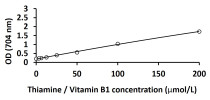ARG83392
Thiamine / Vitamin B1 Assay Kit
Thiamine / Vitamin B1 Assay Kit for Functional study and Other
Overview
| Product Description | ARG83392 Thiamine / Vitamin B1 Assay Kit can be used to measure Thiamine / Vitamin B1 in Urine, tissue extracts, cell lysate and other biological fluids. |
|---|---|
| Tested Reactivity | Other |
| Tested Application | FuncSt |
| Target Name | Thiamine / Vitamin B1 |
| Conjugation Note | Read at 704 nm |
| Sensitivity | 1 μmol/L |
| Sample Type | Urine, tissue extracts, cell lysate and other biological fluids. |
| Standard Range | 2 μmol/l - 200 μmol/l |
| Sample Volume | 50 μl |
| Alternate Names | thiamine; thiamin; vitamin B1; Aneurin; Antiberiberi factor; Thiamine ion; thiaminium; Betaxin |
Application Instructions
| Assay Time | 30 min |
|---|
Properties
| Form | 96 well |
|---|---|
| Storage Instruction | Store the kit at 4°C. Keep microplate wells sealed in a dry bag with desiccants. Do not expose test reagents to heat, sun or strong light during storage and usage. Please refer to the product user manual for detail temperatures of the components. |
| Note | For laboratory research only, not for drug, diagnostic or other use. |
Bioinformation
| Background | Thiamine or thiamin, also known as vitamin B1, is a colorless compound with the chemical formula C12H17N4OS. It is soluble in water and insoluble in alcohol. Thiamine decomposes if heated. Thiamine was first discovered by Umetaro Suzuki in Japan when researching how rice bran cured patients of Beriberi. Thiamine plays a key role in intracellular glucose metabolism and it is thought that thiamine inhibits the effect of glucose and insulin on arterial smooth muscle cell proliferation. Thiamine plays an important role in helping the body convert carbohydrates and fat into energy. It is essential for normal growth and development and helps to maintain proper functioning of the heart and the nervous and digestive systems. Thiamine cannot be stored in the body; however, once absorbed, the vitamin is concentrated in muscle tissue. |
|---|---|
| Function | Thiamine is important not only for mitochondrial membrane development, but also for synaptic membrane function. It has also been suggested that a deficiency hinders brain development in infants and may be a cause of sudden infant death syndrome. |
| Highlight | Well-known disorders caused by thiamine deficiency include beriberi, Wernicke–Korsakoff syndrome, optic neuropathy, Leigh's disease, African seasonal ataxia (or Nigerian seasonal ataxia), and central pontine myelinolysis. Symptoms include malaise, weight loss, irritability and confusion. |
Images (1) Click the Picture to Zoom In
| Title | Download Link |
|---|---|
| ARG83392 Thiamine / Vitamin B1 Assay Kit User manual |
 Download Download
|






